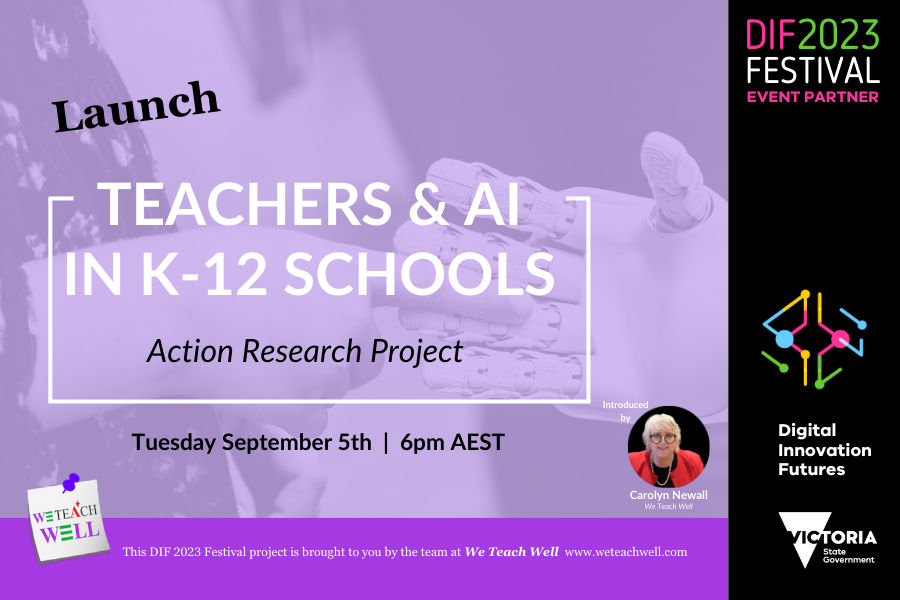Context
We have all been benefiting from AI for quite some time, albeit most of us didn’t know. Think Siri and Alexa, Netflix and Spotify, search engines and analytics, natural language processing and fraud detection.
However it became a really hot topic when iterative improvements and the specific variant called ChatGPT garnered mass adoption late in 2022 and early 2023.
What has become obvious is that, like Pandora’s Box, now that it is out there, widespread access to AI is not going away. We can’t go back. And the speed that AI is proliferating can make your head spin. There are a vast number of other AI products on the market now. Midjourney Perplexity and Lensa are only a few.
AI, what it can and can’t do has monopolised education discussions in 2023. Both in tertiary and K-12. Whether it is wonderful or a quick trip to the dark side depends on your point of view.
Many education departments and schools have chosen to ban the use of AI by students. The main reason for this is valid, if annoying to some. We don’t know exactly how it works, we don’t know what it can be used for. Often we forget that K-12 schools are legally responsible for the physical, emotional and mental safety of the children in their care. Other people’s children.
Purpose
But what we can’t do is wait till a few academics somewhere do research studies over a few years to come up with some findings.
We need the knowledge quicker, and we need it to be from the perspective of classroom teachers and other educators in the K-12 field.
A Danger
As in the beginning of the pandemic we saw the rise of edtech businesses, many with no specialty in education, offering services and resources to schools and teachers. A similar thing is happening with AI. New businesses, with not much more knowledge than teachers have, are using AI to create materials that they are then selling to teachers.
This has a number of potential problems. Firstly, teachers are not engaging with the tech, they are not learning how it works so are unable to help students use it well. Secondly, the businesses creating these products are often not K-12 educators. They don’t know the students in a class or the specific scheme of work a teacher is delivering. What can happen over time is that, rather than the school and teachers directing teaching and learning, curriculum becomes dictated by technology businesses. In the same way that major education publishers influenced curriculum in the past.
Time
We know that a central concern is that teachers don’t have the time to learn the technology themselves and that is why they pay someone else for it. Sadly that often means they are missing out on creating the things they are good at and enjoy. Perhaps there are ways of engaging with the technology that can minimise the administrative work that teachers are burdened by, and give them back time for the activities they are uniquely trained for.
The Proposal
We Teach Well is proposing an action research project that will involve a number of teachers and educators who commit to using AI in their work for a year. Over the following 12 months we will hold open sessions online each month to gather and share data. Participants will be able to contact each other to discuss findings or ask for help and suggestions.
The project will launch during the DIF2023 Festival in Victoria and the findings will be published at the DIF2024 Festival.
Importantly, this is NOT for student use. That is the purview of the schools.
We are proposing a maximum of 30 actual participants, but other educators can, if helpful, offer advice, mentorship and support.
Participants will come from each of the 3 primary systems: Government, Independent and Catholic K-12 schools. We know that there are many schools in the Independant and Catholic systems who are already using AI in their work because most of the blanket bans have been in State Government schools.
Some of the questions that have already been raised are around how we teach the language students will need to use the technology well, and what to do about ethical issues.
Who This is For
- Teachers who are already using AI and want to explore it further and/or share their learnings with colleagues.
- Teachers who are unsure of the technology but would appreciate a safe and supportive space to explore the possibilities of AI and how it could assist their teaching and learning.
- School leaders who are concerned about the unknown aspects of the technology and want more information before having students use it in their school.
- School leaders who are keen to discover professional development options for their staff.
